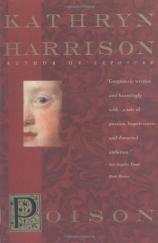Reading Group Guide
Discussion Questions
Poison

1. Sexuality, religion and literacy are linked strongly throughout Poison. Francisca says, "Venite ad me. Alvaro spoke to me in Latin, the language of the Church and all her saints, and when he called me to him with those words our union existed not only out of time but beyond ordinary and profane human conversation as well. We became sacred together." (p. 179) Why do Alvaro's words have such power to seduce Francisca? What does she mean by saying, "I was never sure which Alvaro I wanted, angel or mortal?" (p. 183) In what ways does her obsession with the lives of Saint Teresa of Avila and the martyrs make her so vulnerable to Alvaro? How is she able to maintain the belief that their love is sacred despite its clear defiance of social propriety and Church law?
2. The connection between literacy and witchcraft also pervades the novel. Why are the citizens in Francisca's region so superstitious and fearful of those who can read? Why do the Inquisitors seek to punish the literate even when they read books written by the holy people of the Church? Why is Francisca's affair with Alvaro considered so dangerous to the social order?
3. The countries of Spain and France are continually compared and contrasted in the text. Francisca says, "I am my father's daughter. I am a daughter of the Castile," (p. 26) land of Don Quixote, "a somber, guilty kingdom." (p. 236) Marie Louise is a child of Parisian splendor, accustomed to a life filled with fragrant flowers and "endless dizzy balls." (p. 47) How do the geographic backgrounds of these women help shape their characters? How do they lead to their downfalls?
4. The name "Francisca" means "the free one." (p. 185) In what ways is this true? In what ways ironic?
5. Francisca says at the novel's opening that her mother represents "a taste of something of which I never have my fill." (p. 27) Both Francisca and Marie Louise share extraordinarily strong bonds with their mothers. How do these relationships sustain them throughout their lives? How do they contribute to and, early in the novel, foreshadow the disastrous events that befall them? How does Alvaro's presence at-Concepcion's death act as a catalyst to his relationship with Francisca?
6. The relationship between Francisca and her sister Dolores is portrayed as deeply disturbed. To what extent is this attributable to their personality differences? To their attachments to their parents? Which is the stronger motivation for Dolores's treacherous act of betraying Francisca: jealousy or fear? Of the two sisters, who has the unhappier life, in your estimation?
7. At the wedding of Marie Louise to Carlos, both she and Francisca wear distinctive clothing: a smock of shame for Francisca and a "gown of misery" covering Marie Louise's bridal splendor. (pp. 50-51) What does the imposition of these garments upon the two women reveal about society's expectations for and fear of them? How do they foreshadow what each woman will wear at the novel's conclusion?
8. Silk production is a leitmotif of the novel that illuminates the characters and becomes a metaphor for the transformations each major character undergoes. What does Francisca mean when she says, "I am a silkworm," as she is being tortured in the tunnels? (pp. 115-117) How is her expected "martyrdom" and transcendence symbolized by the lives of silkworms? In what ways does the course of Francisca's questioning by the Inquisition, "the wash works," (p. 114) parallel the centuries old enslavement of the silkworm? What is the significance of Francisca meeting her lover in the silk house?
9. The color white appears as a frequent symbol. It is both the color of Francisca's torturers' hoods and the color, at Marie Louise's death, of "innocence restored." (p. 312) How does it play a part in and link the experiences of birth? Marriage? Torture? Death? Angels and martyrdom? And what is the significance of the presence of other colors: the purple of Alvaro's hose? The red cloth that hangs in the confessional? The crimson of Marie Louise's monthly flow and the blood lanced from her veins?
10. Carlos is portrayed as nauseatingly weak and ineffectual. How, then, is he able to so thoroughly destroy Marie Louise? How does his weakness motivate the people of Spain? His mother? His court?
11. What is the significance of the title Poison? The king s mother is responsible for murdering Marie Louise, but who else is responsible, metaphorically, for her poisoning? For Francisca's? In what ways are the heroines of the novel considered poison by their society?
12. Francisca says, "Barrenness is a burden that a woman bears alone." (p. 303) Why does she feel this state is even sadder than losing a beloved child? What does she mean when she describes giving birth to Mateo as like giving birth to herself? (p. 264) To God? (p. 265)
13. The Catholic sacrament of confession is a recurring symbol. What is the significance of the fever that befalls Francisca after lying to Alvaro in the confessional? How does falling in love with a priest transform Francisca herself into a confessor by the novel's conclusion? Francisca confesses over and over to the White Hoods, despite her determination to refuse. What is the meaning of her disturbing explanation: "You want to love your torturer, too. Yes, that is easier than hating him, it requires much less strength to make him your final passion, to die of love for him?" (p. 177)
14. At the end of the book, Francisca says, "What do I believe? In nothing, and in everything." (p. 312) How do the events of her life lead her to this paradoxical description of her faith? In her circumstances, wouldyou believe in "everything" or in "nothing"?
Poison
- Publication Date: September 1, 1996
- Paperback: 336 pages
- Publisher: Harper Perennial
- ISBN-10: 0380727412
- ISBN-13: 9780380727414








